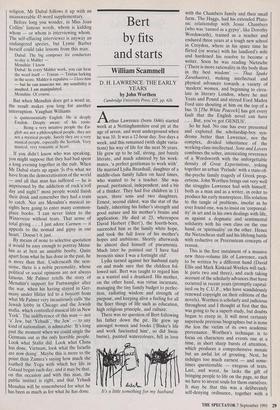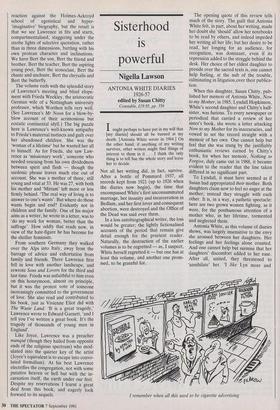Bert by fits and starts
William Scammell
D. H. LAWRENCE: THE EARLY YEARS by John Worthen Cambridge University Press, £25, pp. 626 Arthur Lawrence (born 1846) started work at a Nottinghamshire coal pit at the age of seven, and went underground when he was 10. It was a 12-hour day, five days a week, and this remained (with slight varia- tions) his way of life for the next 56 years. He grew up to be tall, strong, just barely literate, and much admired by his work- mates, 'a perfect gentleman to work with'. He married Lydia Beardsall, daughter of a middle-class family fallen on hard times, who wanted to be a teacher. She was proud, puritanical, independent, and a bit of a thinker. They had five children in 11 years, three sons and two daughters. Ernest, second eldest, was the star of the family, inheriting his father's strength and good nature and his mother's brains and application. He died at 23, whereupon David Herbert ('Bert), the fourth-born, succeeded him as the family white hope, and took the full force of his mother's hopes and ambitions. Shortly afterwards he almost died himself of pneumonia. Much later he pointed out 'I have had broncitis since I was a fortnight old'.
Lydia turned against her husband early on and made sure that the children fol- lowed suit. Bert was taught to regard him as a wastrel and a drunkard. His mother, on the other hand, was virtue incarnate, managing the tiny family budget to perfec- tion, radiating wisdom and strength of purpose, and keeping alive a feeling for all the finer things of life such as education, high religious principle, and culture.
There was no question of Bert following his father down the pit. He grew up amongst women and books ('Blake's life and work fascinated him', so did Swin- burne), painted watercolours, fell in love It's a little something for my husband
with the Chambers family and their small farm, The Haggs, had his extended Plato- nic relationship with Jessie Chambers (who was 'tanned as a gypsy', like Dorothy Wordsworth), trained as a teacher and endured three years at a tough new school in Croydon, where in his spare time he flirted (or worse) with his landlord's wife and hardened his resolve to become a writer. Soon he was reading Nietzsche (`There is more rationality in thy body than in thy best wisdom' — Thus Spake Zarathustra), making intellectual and physical advances towards a variety of 'modern' women, and beginning to circu- late in literary London, where he met Yeats and Pound and stirred Ford Madox Ford into shouting at him on the top of a bus 'It [The White Peacock] has got every fault that the English novel can have . . . But, you've got GENIUS'.
So he had. No one has ever presented and explored the scholarship-boy syn- drome better than Lawrence, nor the complex, divided inheritance of the working-class intellectual. Sons and Lovers combines the sober, intoxicating reverence of a Wordsworth with the unforgettable density of Great Expectations, yoking together an urban 'Prelude' with a state-of- the-psyche family tragedy of Greek prop- ortions. John Worthen brings out very well the struggles Lawrence had with himself, both as a man and as a writer, in order to produce his early masterpiece. His solution to the tangle of problems, insofar as he ever found one, was to insist on 'corporeal- ity' in art and in his own dealings with life, as against a dogmatic and sentimental solidarity with his own class on the one hand, or 'spirituality' on the other. Hence the Nietzschean stuff and his lifelong battle with reductive or Procrustean concepts of reason.
This is the first instalment of a massive new three-volume life of Lawrence, each to be written by a different hand (David Ellis and Mark Kinkead-Weekes will tack- le parts two and three), and each taking account of the scholarly advances that have occurred in recent years (promptly capital- ised on by C.U.P., who have scandalously renewed copyright on their editions of the novels). Worthen is scholarly and judicious throughout and I thought at first that this was going to be a superb study, but doubts began to creep in. It will most certainly supersede previous biographies but is none the less the victim of its own academic provenance. Worthen's technique is to focus on characters and events one at a time, in short sharp bursts of attention, which produces a comprehensive mosaic but an awful lot of grouting. Next, he indulges too much earnest — and some- times questionable — exegesis of texts. Last, and worst, he lacks the gift of bringing people to life on the page, so that we have to invent souls for them ourselves. It may be that this was a deliberately self-denying ordinance, together with a reaction against the Holmes-Ackroyd school of egotistical and hyper- 'imaginative' biography, but the result is that we see Lawrence in fits and starts, compartmentalised, staggering under the strobe lights of selective quotation, rather than in three dimensions, battling with his own protean character and inclinations. We have Bert the son, Bert the friend and brother, Bert the teacher, Bert the aspiring young poet, Bert the iconoclast, Bert the chaste and unchaste, Bert the chrysalis and Bert the butterfly.
The volume ends with the splendid story of Lawrence's meeting and blind elope- ment with Frieda Weekley, the aristocratic German wife of a Nottingham university professor, which Worthen tells very well. (See Lawrence's Mr Noon for a blow-by- blow account of their acrimonious but ecstatic continental idyll.) The big puzzle here is Lawrence's well-known antipathy to Frieda's maternal instincts and guilt over her abandoned children. She was the 'woman of a lifetime' but he wanted her all to himself. As for Frieda, she saw Law- rence as 'missionary work', someone who needed rescuing from his own dividedness between spirit and flesh — though the sardonic phrase leaves much else out of account. She was a mother of three, still young and vital at 33. He was 27, with both his mother and 'Miriam' left more or less firmly behind. 'The real way of living is to answer to one's wants'. But where do those wants begin and end? Evidently not in children and the family. One of his major aims as a writer, he wrote in a letter, was to `do my work for woman, better than the suffrage'. How oddly that reads now, in view of the hate-figure he has become for the shriller feminists.
From southern Germany they walked over the Alps into Italy, away from the barrage of advice and exhortation from family and friends. There Lawrence first fell in love with another landscape, and rewrote Sons and Lovers for the third and last time. Frieda was unfaithful to him even on this honeymoon, almost on principle, but it was the protest vote of someone increasingly committed to the government of love. She also read and contributed to his book, just as Vivienne Eliot did with The Waste Land. 'It is a great tragedy,' Lawrence wrote to Edward Garnett, 'and I tell you I've written a great book. It's the tragedy of thousands of young men in England'.
Like Joyce, Lawrence was a preacher manqué (though they hailed from opposite ends of the religious spectrum) who mod- ulated into the quieter key of the artist (Joyce's equivalent is to escape into convo- luted formalism). At his best Lawrence electrifies the congregation, not with some putative heaven or hell but with the in- carnation itself, the earth under our feet. Despite my reservations I learnt a great deal from this book, and eagerly look forward to its sequels.



















































 Previous page
Previous page